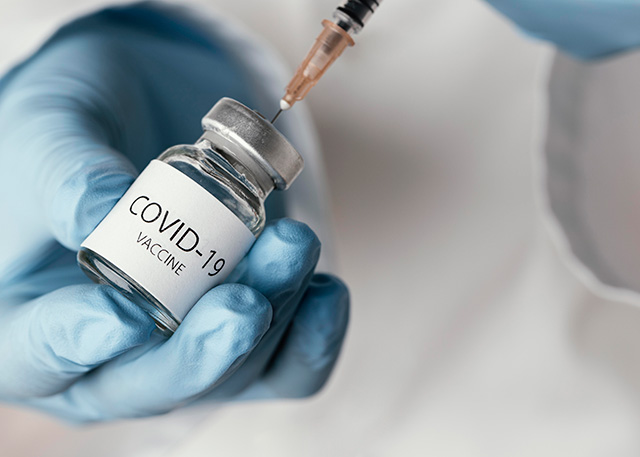News | SummitMD
COVID-19 Infection Poses Bigger Risk for Myocarditis than mRNA Vaccine, even for Young Males
Research updates collectively stress low incidence of Pfizer/Moderna vaccine-related myocarditis with benefits outweighing ‘rare risk’
 The latest and largest study on COVID-19 messenger RNA-based (mRNA) vaccines showed myocarditis was a rare and low risk - even in the younger male population - helping cool off lingering safety concerns after issues first surfaced earlier this year.
The latest and largest study on COVID-19 messenger RNA-based (mRNA) vaccines showed myocarditis was a rare and low risk - even in the younger male population - helping cool off lingering safety concerns after issues first surfaced earlier this year.
The study found that infection with COVID-19 itself posed more significant concerns for myocarditis than with either the mRNA- or adenovirus-based vaccines.
Published by Martina Patone, MD (University of Oxford, Oxford, UK) and colleagues in Nature Medicine on Dec. 14[1], the British study found patients infected with COVID-19 had a higher risk for myocarditis than those who received the Pfizer/BioNTech (BNT162b2), Moderna (mRNA-1273), or AstraZeneca (ChAdOx1) vaccine.
"While myocarditis can be life-threatening, most vaccine-associated myocarditis events were mild and self-limiting," Patone and colleagues wrote. "The risk observed is small and confined to 7 days following vaccination whereas the lifetime risk of morbidity following SARS-CoV-2 infection is substantial. SARS-CoV-2 infection was associated with a substantial increase in hospitalization or death risks from myocarditis, pericarditis, and cardiac arrhythmia."
The self-controlled case study enrolled around 38 million people in England (>16 years) vaccinated between Dec. 2020 and Aug. 21 to investigate the link between COVID-19 infection-related and vaccine-related myocarditis.
Researchers found the risk of myocarditis rose with both a COVID-19 infection and mRNA vaccine administration, but the risk was significantly higher for those infected with the virus. Results showed the risk of myocarditis totaled to 1-10 per one million vaccinated persons and 40 per one million COVID-19 patients. Subgroup analysis also showed the higher risk of vaccine-related myocarditis only applied to those below 40 years.
COVID-19- or mRNA vaccine-related myocarditis
(total population)
Excess myocarditis events 28 days after 1st dose
(per 1M vaccinated)
Excess myocarditis events after 2nd dose
(per 1M vaccinated)
Pfizer/BioNTech vaccine
1/1,000,000 (95% CI, 0-2)
(IRR not significant)
Moderna vaccine
6/1,000,000 (95% CI, 2-8)
10/1,000,000 (95% CI, 7-11)
COVID-19 infection (within 28 days of positive test)
40/1,000,000 (95% CI, 38-41)
COVID-19- or mRNA-vaccine-related myocarditis
(<40 years)
Excess myocarditis events 28 days after 1st dose
(per 1M vaccinated)
Excess myocarditis events after 2nd dose
(per 1M vaccinated)
Pfizer/BioNTech vaccine
2/1,000,000 (95% CI, 1-3)
3/1,000,000 (95% CI, 2-4)
Moderna vaccine
8/1,000,000 (95% CI, 4-9)
15/1,000,000 (95% CI, 12-16)
COVID-19 infection (within 28 days of positive test)
10/1,000,000 (95% CI, 7-11)
Myocarditis is an inflammation of the heart muscle that commonly results from a viral infection, immune-mediated disease, or specific immunomodulatory therapies. The condition is diagnosed in about 10 to 20 people per 10,000 individuals in the general population. Immunization-related myocarditis has been reported with smallpox, influenza, and hepatitis B vaccines but as a rare adverse event occurring more frequently in younger and male populations.
More data on myocarditis helps ease mRNA-vax qualm
 The latest data adds to the body of research demonstrating a low risk of mRNA vaccine-related myocarditis. Israeli researchers had on Dec. 2 published two independent studies simultaneously in the New England Journal of Medicine (NEJM) that proved similar results.
The latest data adds to the body of research demonstrating a low risk of mRNA vaccine-related myocarditis. Israeli researchers had on Dec. 2 published two independent studies simultaneously in the New England Journal of Medicine (NEJM) that proved similar results.
The data underlies the necessity to recognize the risk of myocarditis is much higher with the COVID-19 infection itself than the vaccine, and benefits of vaccination significantly outweigh the risks.
Mevorach, MD (Hadassah Medical Center, Jerusalem, Israel) and colleagues[2] reported that the link between myocarditis and mRNA vaccines was present, but a rare and small increased risk characterized by mild symptoms.
Guy Witberg, MD (Tel-Aviv University, Tel Aviv-Yafo, Israel) and team also examined the Israeli health care system further to confirm the higher risk of myocarditis in younger males, but symptoms were of mild-to-moderate severity[3].
In an accompanying editorial[4], Alida L.P. Caforio, MD, PhD (University of Padua, Padua, Italy) noted the mild cases often resolved in an "uneventful course" and stressed the need for endomyocardial biopsy-proven myocarditis to confirm a solid link between mRNA vaccines and myocarditis.
"The take-home message may be that clinically suspected myocarditis is temporarily associated with Pfizer's mRNA vaccine but rare, more common in young male patients, and (with few exceptions) self-limiting," Caforio wrote. "As acknowledged by the authors, temporal association does not imply causation, and the risk of vaccinal myocarditis is very low."
For study limitations, Caforio said: "Biopsy-proven myocarditis may be caused by infectious (mainly viral) or noninfectious sources, including toxic and immune causes. It follows that a truly definitive myocarditis diagnosis related to vaccination would require an endomyocardial biopsy. Myocarditis (including from COVID-19 infection) needs to be ruled out to exclude a chance occurrence of myocarditis temporally associated with the vaccine."
Early reports from Israel, US clarified but needs further research on mechanism
The latest findings may help diminish vaccine hesitancy arising from the early reports of mRNA vaccine-related myocarditis in the young male population in the U.S. and Israel.
Active surveillance should continue; moreover, truly definitive myocarditis diagnosis related to vaccination requires endomyocardial biopsy.
The U.S. Centers for Disease Control and Prevention (CDC)[5] issued a statement on the possible link between mRNA vaccines and myocarditis on May 27 following several case reports reported domestically (including in the US military population[6]) and abroad. The CDC later reaffirmed the low risk of myocarditis after mRNA vaccine shots on Aug. 30 after data analysis[7].
The Israeli Ministry of Health also issued a similar statement on Jun. 2 regarding 148 myocarditis cases occurring after mRNA vaccination in Israel between Dec. 2020 and May[8].
Other cases were also reported around the globe, with the Korea Centers for Disease Control and Prevention (KCDC) in July acknowledging the "possible relation" between COVID-19 vaccination and myocarditis after a fatal case concerning myocarditis-induced sudden death five days after the first dose of the Pfizer vaccine[9].
On Aug. 30, New Zealand's Ministry of Health pinned one death to myocarditis after Pfizer shots[10]. The European Medicines Agency (EMA) also confirmed the possibility of a rare association between mRNA vaccines and myocarditis/pericarditis after reporting five related deaths on Sept. 7[11].
Shortly after, however, a research team led by Biykem Bozkurt, MD, PhD (Baylor College of Medicine, Texas, USA) followed through with a study in Circulation[12] on July 20 that demonstrated mRNA vaccine-related myocarditis was rare and recommended Pfizer and Moderna vaccines to those 12 years and older.
Bozkurt and colleagues had found that of the 61 myocarditis cases, most reported chest pain two to three days after the second dose of an mRNA vaccine. Patients hospitalized for myocarditis were predominantly young males without a prior history of COVID-19 infection or comorbidities.
"The reasons for male predominance in myocarditis cases are unknown, but possible explanations relate to sex hormone differences in immune response and myocarditis, and also underdiagnosis of cardiac disease in women," researchers wrote. "Despite rare cases of myocarditis, the benefit-risk assessment for COVID-19 vaccination shows a favorable balance for all age and sex groups."
On Sept. 16, Noam Barda, MD, PhD (Clalit Research Insitute, Tel-Aviv, Israel) and colleagues further confirmed the safety of COVID-19 vaccinations among about 885,000 vaccinated (>16 years) with no previous COVID-19 infection in the NEJM[13].
Results showed the excessive risk of mRNA vaccine-related myocarditis was very low with 1-5 events per 100,000 vaccinations. The risk of myocarditis due to COVID-19 infection was significantly higher than mRNA vaccines (11 events per 100,000 COVID-19 patients).
Myocarditis in total population
mRNA vaccine
COVID infection
Risk ratio (RR)
3.24 (CI 1.55-12.44)
18.28 (CI 3.95-25.12)
Risk difference per 100,000
2.7 (CI 1.0-4.6)
11 (CI 5.6-15.8)
Researchers also confirmed more cardiovascular complications - including myocardial infarction, intracranial hemorrhage, and pulmonary embolism - related to the infection itself that far exceed possible risk with the mRNA vaccines.
Valuable results help reduce the fear of myocarditis as a reason to exclude young people from vaccination, especially since myocarditis is also temporally associated with COVID-19.
During the virtual American Heart Association (AHA) 2021 Scientific Sessions on Nov. 14, Bozkurt stressed that "The data underlies the need to recognize myocarditis risk is much higher with the COVID-19 infection itself than the vaccine. Large cohort studies in diverse populations show the risk is not elevated in all populations[…], indicating the benefits of vaccination outweigh the risks."
"Although the mechanisms for [vaccine-related] myocarditis are not clear, factors such as molecular mimicry between the spike protein of SARS-CoV-2 and self-antigens, trigger of preexisting dysregulated immune pathways in certain individuals, immune response to mRNA, and activation of immunologic pathways, and dysregulated cytokine have been proposed," Bozkurt said.
The Pfizer and Moderna vaccines had demonstrated more than 90% efficacy against COVID-19 infection early on. Observational comparative studies indicated that the risk of COVID-19 infection was low with both vaccines - although Pfizer's showed lower efficacy than Moderna's with a 27% higher risk of infection and 70% higher risk of COVID-related hospitalization[14].
Acknowledging the progress but paucity in data through her editorial, Caforio stressed that "valuable results" help "reduce the fear of myocarditis as a reason for excluding young people from vaccination, especially since myocarditis has also been temporally associated with COVID-19. Active surveillance for myocarditis should continue, and endomyocardial biopsy could help affirm the diagnosis and guide therapy in severe cases."
- https://www.nature.com/articles/s41591-021-01630-0
- https://www.nejm.org/doi/full/10.1056/NEJMoa2109730
- https://www.nejm.org/doi/full/10.1056/NEJMoa2110737?query=recirc_curatedRelated_article
- https://www.nejm.org/doi/full/10.1056/NEJMe2116493?query=recirc_curatedRelated_article
- https://www.cdc.gov/coronavirus/2019-ncov/vaccines/safety/myocarditis.html
- https://jamanetwork.com/journals/jamacardiology/fullarticle/2781601
- https://www.cdc.gov/vaccines/acip/meetings/downloads/slides-2021-08-30/03-COVID-Su-508.pdf
- https://www.gov.il/en/departments/news/01062021-03
- https://jkms.org/DOIx.php?id=10.3346/jkms.2021.36.e286
- https://www.health.govt.nz/news-media/media-releases/clinicians-reminded-be-aware-myocarditis-and-pericarditis-symptoms
- https://www.ema.europa.eu/en/news/comirnaty-spikevax-possible-link-very-rare-cases-myocarditis-pericarditis
- https://www.ahajournals.org/doi/10.1161/CIRCULATIONAHA.121.056135
- https://www.nejm.org/doi/full/10.1056/nejmoa2110475
- https://www.nejm.org/doi/full/10.1056/NEJMoa2115463
Edited by

Taeoh Kim, MD
Asan Medical Center, Korea (Republic of)
Written by

YoonJee Marian Chu, Medical Journalist
Read Biography
 The latest and largest study on COVID-19 messenger RNA-based (mRNA) vaccines showed myocarditis was a rare and low risk - even in the younger male population - helping cool off lingering safety concerns after issues first surfaced earlier this year.
The latest and largest study on COVID-19 messenger RNA-based (mRNA) vaccines showed myocarditis was a rare and low risk - even in the younger male population - helping cool off lingering safety concerns after issues first surfaced earlier this year.
The study found that infection with COVID-19 itself posed more significant concerns for myocarditis than with either the mRNA- or adenovirus-based vaccines.
Published by Martina Patone, MD (University of Oxford, Oxford, UK) and colleagues in Nature Medicine on Dec. 14[1], the British study found patients infected with COVID-19 had a higher risk for myocarditis than those who received the Pfizer/BioNTech (BNT162b2), Moderna (mRNA-1273), or AstraZeneca (ChAdOx1) vaccine.
"While myocarditis can be life-threatening, most vaccine-associated myocarditis events were mild and self-limiting," Patone and colleagues wrote. "The risk observed is small and confined to 7 days following vaccination whereas the lifetime risk of morbidity following SARS-CoV-2 infection is substantial. SARS-CoV-2 infection was associated with a substantial increase in hospitalization or death risks from myocarditis, pericarditis, and cardiac arrhythmia."
The self-controlled case study enrolled around 38 million people in England (>16 years) vaccinated between Dec. 2020 and Aug. 21 to investigate the link between COVID-19 infection-related and vaccine-related myocarditis.
Researchers found the risk of myocarditis rose with both a COVID-19 infection and mRNA vaccine administration, but the risk was significantly higher for those infected with the virus. Results showed the risk of myocarditis totaled to 1-10 per one million vaccinated persons and 40 per one million COVID-19 patients. Subgroup analysis also showed the higher risk of vaccine-related myocarditis only applied to those below 40 years.
|
COVID-19- or mRNA vaccine-related myocarditis (total population) |
Excess myocarditis events 28 days after 1st dose (per 1M vaccinated) |
Excess myocarditis events after 2nd dose (per 1M vaccinated) |
|---|---|---|
| Pfizer/BioNTech vaccine | 1/1,000,000 (95% CI, 0-2) | (IRR not significant) |
| Moderna vaccine | 6/1,000,000 (95% CI, 2-8) | 10/1,000,000 (95% CI, 7-11) |
| COVID-19 infection (within 28 days of positive test) | 40/1,000,000 (95% CI, 38-41) | |
|
COVID-19- or mRNA-vaccine-related myocarditis (<40 years) |
Excess myocarditis events 28 days after 1st dose (per 1M vaccinated) |
Excess myocarditis events after 2nd dose (per 1M vaccinated) |
| Pfizer/BioNTech vaccine | 2/1,000,000 (95% CI, 1-3) | 3/1,000,000 (95% CI, 2-4) |
| Moderna vaccine | 8/1,000,000 (95% CI, 4-9) | 15/1,000,000 (95% CI, 12-16) |
| COVID-19 infection (within 28 days of positive test) | 10/1,000,000 (95% CI, 7-11) | |
Myocarditis is an inflammation of the heart muscle that commonly results from a viral infection, immune-mediated disease, or specific immunomodulatory therapies. The condition is diagnosed in about 10 to 20 people per 10,000 individuals in the general population. Immunization-related myocarditis has been reported with smallpox, influenza, and hepatitis B vaccines but as a rare adverse event occurring more frequently in younger and male populations.
More data on myocarditis helps ease mRNA-vax qualm
 The latest data adds to the body of research demonstrating a low risk of mRNA vaccine-related myocarditis. Israeli researchers had on Dec. 2 published two independent studies simultaneously in the New England Journal of Medicine (NEJM) that proved similar results.
The latest data adds to the body of research demonstrating a low risk of mRNA vaccine-related myocarditis. Israeli researchers had on Dec. 2 published two independent studies simultaneously in the New England Journal of Medicine (NEJM) that proved similar results.
The data underlies the necessity to recognize the risk of myocarditis is much higher with the COVID-19 infection itself than the vaccine, and benefits of vaccination significantly outweigh the risks.
Mevorach, MD (Hadassah Medical Center, Jerusalem, Israel) and colleagues[2] reported that the link between myocarditis and mRNA vaccines was present, but a rare and small increased risk characterized by mild symptoms.
Guy Witberg, MD (Tel-Aviv University, Tel Aviv-Yafo, Israel) and team also examined the Israeli health care system further to confirm the higher risk of myocarditis in younger males, but symptoms were of mild-to-moderate severity[3].
In an accompanying editorial[4], Alida L.P. Caforio, MD, PhD (University of Padua, Padua, Italy) noted the mild cases often resolved in an "uneventful course" and stressed the need for endomyocardial biopsy-proven myocarditis to confirm a solid link between mRNA vaccines and myocarditis.
"The take-home message may be that clinically suspected myocarditis is temporarily associated with Pfizer's mRNA vaccine but rare, more common in young male patients, and (with few exceptions) self-limiting," Caforio wrote. "As acknowledged by the authors, temporal association does not imply causation, and the risk of vaccinal myocarditis is very low."
For study limitations, Caforio said: "Biopsy-proven myocarditis may be caused by infectious (mainly viral) or noninfectious sources, including toxic and immune causes. It follows that a truly definitive myocarditis diagnosis related to vaccination would require an endomyocardial biopsy. Myocarditis (including from COVID-19 infection) needs to be ruled out to exclude a chance occurrence of myocarditis temporally associated with the vaccine."
Early reports from Israel, US clarified but needs further research on mechanism
The latest findings may help diminish vaccine hesitancy arising from the early reports of mRNA vaccine-related myocarditis in the young male population in the U.S. and Israel.
Active surveillance should continue; moreover, truly definitive myocarditis diagnosis related to vaccination requires endomyocardial biopsy.
The U.S. Centers for Disease Control and Prevention (CDC)[5] issued a statement on the possible link between mRNA vaccines and myocarditis on May 27 following several case reports reported domestically (including in the US military population[6]) and abroad. The CDC later reaffirmed the low risk of myocarditis after mRNA vaccine shots on Aug. 30 after data analysis[7].
The Israeli Ministry of Health also issued a similar statement on Jun. 2 regarding 148 myocarditis cases occurring after mRNA vaccination in Israel between Dec. 2020 and May[8].
Other cases were also reported around the globe, with the Korea Centers for Disease Control and Prevention (KCDC) in July acknowledging the "possible relation" between COVID-19 vaccination and myocarditis after a fatal case concerning myocarditis-induced sudden death five days after the first dose of the Pfizer vaccine[9].
On Aug. 30, New Zealand's Ministry of Health pinned one death to myocarditis after Pfizer shots[10]. The European Medicines Agency (EMA) also confirmed the possibility of a rare association between mRNA vaccines and myocarditis/pericarditis after reporting five related deaths on Sept. 7[11].
Shortly after, however, a research team led by Biykem Bozkurt, MD, PhD (Baylor College of Medicine, Texas, USA) followed through with a study in Circulation[12] on July 20 that demonstrated mRNA vaccine-related myocarditis was rare and recommended Pfizer and Moderna vaccines to those 12 years and older.
Bozkurt and colleagues had found that of the 61 myocarditis cases, most reported chest pain two to three days after the second dose of an mRNA vaccine. Patients hospitalized for myocarditis were predominantly young males without a prior history of COVID-19 infection or comorbidities.
"The reasons for male predominance in myocarditis cases are unknown, but possible explanations relate to sex hormone differences in immune response and myocarditis, and also underdiagnosis of cardiac disease in women," researchers wrote. "Despite rare cases of myocarditis, the benefit-risk assessment for COVID-19 vaccination shows a favorable balance for all age and sex groups."
On Sept. 16, Noam Barda, MD, PhD (Clalit Research Insitute, Tel-Aviv, Israel) and colleagues further confirmed the safety of COVID-19 vaccinations among about 885,000 vaccinated (>16 years) with no previous COVID-19 infection in the NEJM[13].
Results showed the excessive risk of mRNA vaccine-related myocarditis was very low with 1-5 events per 100,000 vaccinations. The risk of myocarditis due to COVID-19 infection was significantly higher than mRNA vaccines (11 events per 100,000 COVID-19 patients).
| Myocarditis in total population | mRNA vaccine | COVID infection |
|---|---|---|
| Risk ratio (RR) | 3.24 (CI 1.55-12.44) | 18.28 (CI 3.95-25.12) |
| Risk difference per 100,000 | 2.7 (CI 1.0-4.6) | 11 (CI 5.6-15.8) |
Researchers also confirmed more cardiovascular complications - including myocardial infarction, intracranial hemorrhage, and pulmonary embolism - related to the infection itself that far exceed possible risk with the mRNA vaccines.
Valuable results help reduce the fear of myocarditis as a reason to exclude young people from vaccination, especially since myocarditis is also temporally associated with COVID-19.
During the virtual American Heart Association (AHA) 2021 Scientific Sessions on Nov. 14, Bozkurt stressed that "The data underlies the need to recognize myocarditis risk is much higher with the COVID-19 infection itself than the vaccine. Large cohort studies in diverse populations show the risk is not elevated in all populations[…], indicating the benefits of vaccination outweigh the risks."
"Although the mechanisms for [vaccine-related] myocarditis are not clear, factors such as molecular mimicry between the spike protein of SARS-CoV-2 and self-antigens, trigger of preexisting dysregulated immune pathways in certain individuals, immune response to mRNA, and activation of immunologic pathways, and dysregulated cytokine have been proposed," Bozkurt said.
The Pfizer and Moderna vaccines had demonstrated more than 90% efficacy against COVID-19 infection early on. Observational comparative studies indicated that the risk of COVID-19 infection was low with both vaccines - although Pfizer's showed lower efficacy than Moderna's with a 27% higher risk of infection and 70% higher risk of COVID-related hospitalization[14].
Acknowledging the progress but paucity in data through her editorial, Caforio stressed that "valuable results" help "reduce the fear of myocarditis as a reason for excluding young people from vaccination, especially since myocarditis has also been temporally associated with COVID-19. Active surveillance for myocarditis should continue, and endomyocardial biopsy could help affirm the diagnosis and guide therapy in severe cases."
- https://www.nature.com/articles/s41591-021-01630-0
- https://www.nejm.org/doi/full/10.1056/NEJMoa2109730
- https://www.nejm.org/doi/full/10.1056/NEJMoa2110737?query=recirc_curatedRelated_article
- https://www.nejm.org/doi/full/10.1056/NEJMe2116493?query=recirc_curatedRelated_article
- https://www.cdc.gov/coronavirus/2019-ncov/vaccines/safety/myocarditis.html
- https://jamanetwork.com/journals/jamacardiology/fullarticle/2781601
- https://www.cdc.gov/vaccines/acip/meetings/downloads/slides-2021-08-30/03-COVID-Su-508.pdf
- https://www.gov.il/en/departments/news/01062021-03
- https://jkms.org/DOIx.php?id=10.3346/jkms.2021.36.e286
- https://www.health.govt.nz/news-media/media-releases/clinicians-reminded-be-aware-myocarditis-and-pericarditis-symptoms
- https://www.ema.europa.eu/en/news/comirnaty-spikevax-possible-link-very-rare-cases-myocarditis-pericarditis
- https://www.ahajournals.org/doi/10.1161/CIRCULATIONAHA.121.056135
- https://www.nejm.org/doi/full/10.1056/nejmoa2110475
- https://www.nejm.org/doi/full/10.1056/NEJMoa2115463
Edited by

Taeoh Kim, MD
Asan Medical Center, Korea (Republic of)
Written by


Leave a comment